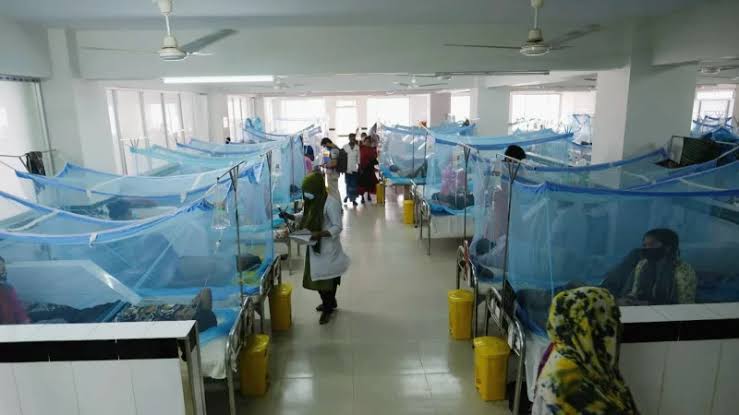Shamiur Rahman Lipu
Published:2025-08-03 07:36:45 BdST
Key public hospitals lack testing amid Chikungunya surge in Ctg
Amid the significant spread of mosquito-borne disease Chikungunya, affected patients have been facing manifold crises in getting treatment, since the three key public hospitals – Chattogram Medical College Hospital (CMCH), Chattogram General Hospital and even the specialised Bangladesh Institute of Tropical and Infectious Diseases (BITID) – lack the facility to diagnose the disease.
Physicians at these hospitals – which receive the major portion of patients, especially those from the lower-income group – are being compelled to treat patients based solely on symptoms, as costly tests are available only at private diagnostic centers.
Sources at prominent private diagnostic centers in the city reveal an alarming trend that 70-80 patients, out of every 100, suffering from fever are being diagnosed with Chikungunya.
At Epic Healthcare Center, for instance, 190 out of 255 patients tested over the past week were found positive for Chikungunya, indicating a detection rate of 75%. The rate was 78% at Parkview Hospital and 68% at Chattogram Metropolitan Diagnostic Center.
Hospitals overflowed with patients
Since early July, a steady influx of patients with fever - mostly infants, children, and the elderly - has overwhelmed CMCH. The number of in-patients has reportedly tripled compared to the hospital’s bed capacity.
On Friday afternoon, the Daily Sun found dozens of patients lying on mats on the floor of the hospital’s medicine ward, with most of them suffering from high fever.
Mohammad Ibrahim, one of the patients, said, “I came here one week ago with fever and body aches. The doctor suspected Chikungunya and advised diagnosis.”
“But, this hospital has no facility for the diagnosis while private labs ask for over Tk5,500 for a full test, including dengue. As I couldn’t afford it, I’m just taking the prescribed medicines,” he added.
Some others undergoing treatment there also echoed Ibrahim and shared the same experiences.
CMCH Medicine Department Professor Dr Aniruddha Ghosh said, “We’ve been receiving large numbers of patients with fever over the past month. Since the hospital lacks diagnostic kits, we refer them to private labs.”
“But, many can’t afford the cost, so we are forced to treat them based on symptoms alone,” he said.
“Unlike dengue, public awareness about Chikungunya is quite low. Infected individuals who are bitten by mosquitoes can spread the virus to others. That’s why we advise Chikungunya patients to stay under mosquito nets to break the transmission chain,” he further added.
CMCH Director Brigadier General Md Taslim Uddin said, “We have informed the Directorate General of Health Services (DGHS) and the Ministry of Health about the urgent need for Chikungunya testing kits at the hospital.”
The same scenario was found at the Chattogram General Hospital where at least 250 suspected Chikungunya patients were advised to get blood tests done outside over the last one week.
Lab reports brought back to the hospital revealed that 183 patients were infected with Chikungunya, indicating a 74% positivity rate.
Chattogram Divisional Director of Health Dr Fazle Rabbi said that due to the absence of government testing facilities, they have set a ceiling on private diagnostic test charges.
Combined tests for dengue, Chikungunya, and viral fever must not exceed Tk4,500, he said.
Mentionable, most members of many families living in the city are falling victim to the mosquito-borne disease, symptoms of which include high fever, severe joint pain, and sometimes swelling.
Typically, physicians are finding four types of fever – Chikungunya, Dengue, viral fever, and coronavirus.
But, Chikungunya is the most prevalent at this moment. If a patient experiences fever accompanied by joint pain, bone swelling, and rashes, Chikungunya is highly suspected, physicians said.
The severity of Chikungunya fever reduces within four to five days. However, joint pain can persist for two weeks to two months, they added.
A recent survey by the Institute of Epidemiology, Disease Control and Research (IEDCR) in Chattogram has identified five areas as “high-risk for Chikungunya”.
Those are Chitteshwari, OR Nizam Road, Agrabad, Pahartali and Halishahar.
The Malaria and Mosquito Control wing of the Chattogram City Corporation earlier claimed that in addition to routine conservancy activities, they usually spray larvicide and adulticide to destroy the larvae and adult mosquitoes.
A special team of 90 people was formed at the end of July to focus on the areas, where they are tasked with spraying medicine and removing the stagnant water within CCC jurisdiction.
Unauthorized use or reproduction of The Finance Today content for commercial purposes is strictly prohibited.


